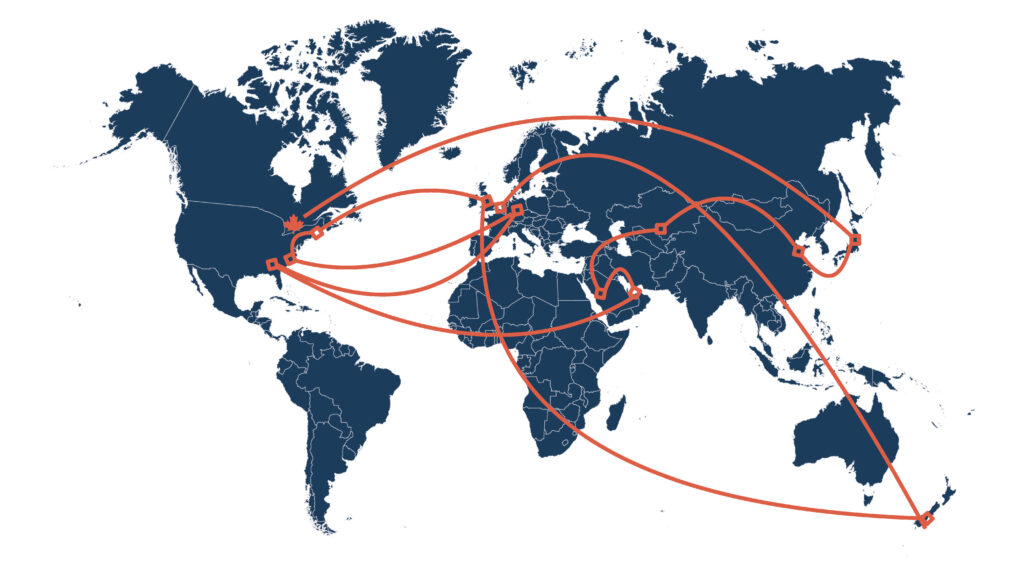Welcome back to the second edition of The Fifteen, where we’re bringing you the most relevant stories from around the world of higher education every two weeks. From edition to edition, we’ll highlight a mix of breaking news stories and revisit old threads as they continue to develop. This time, we’ve got five new studies and ten stories from nine countries on four continents. Strap in and enjoy your trip!

- Restrictions on international student permits are a big deal in Canada, but they are quickly becoming the pollical mode-du-jour across the postsecondary world. We’ve written about this issue in the past, but here’s more advice for surviving the “Great Policy Backlash.” University World News. How Universities Can Survive the ‘Great Policy Backlash’
- The demographic squeeze in Japan is hurting the postsecondary sector. Enrolment at Japanese private universities is falling rapidly. In response, multiple Japanese universities are opening overseas branch campuses. Read those stories here. Nikkei Asia. 59% of Japan’s private universities miss quotas for new enrollment.” Times Higher Education. “Japan moves cautiously on overseas branch campuses.”
- Much has been made of China’s numbers advantage in engineering, with the country graduating a whopping 1.56 million engineers in 2023. However, a recent report shows that Chinese universities are actually cutting engineering degree programs faster than others as enrollment shifts. Read the story here. Sixth Tone, “Why China’s universities are ditching their engineering programs.”
- Rising prosperity, a demographic boom, and an education revolution are all driving an explosion in Uzbekistan’s tertiary education enrolments and ambitions, so much so that it has become the world’s third-biggest host to foreign branch campuses. Download and read the journal article here. International Higher Education, “Uzbekistan Ranks Third Globally as Host of International Branch Campuses.”
- The growing Saudi Arabian postsecondary market has quickly become a key piece of the UK’s international education strategy. The country’s five UK satellite campuses now face fresh competition from five newly approved campuses being established by schools from around the world. Read about it here. The PIE. “Five int’l universities set to open branch campuses in Saudi Arabia.”
- The first “foreign” IIT was set up in Zanzibar a couple of years ago and now there is one in Abu Dhabi. Of note: IIT does not seem to be taking a centralized approach—actually, each one is making its own deals—so this is not IIT-Abu Dhabi but rather IIT Delhi-Abu Dhabi. Something to keep an eye on here. The Economic Times Education, “IIT-Delhi Abu Dhabi opens in UAE capital.”
- In North America, university presidents are serving shorter terms; this new study investigates what skills are most important for success as a leader of a higher-ed institution. Read the story here and check out the full study here. Inside Higher Ed, “Study: The 7 Competencies Presidents Need.”
- A bit late to this one, but the EUA put out a trends report on higher education in Europe this summer, which is very much worth a read: report. European University Association, “Trends 2024.”
- This one is not about higher education per se but on the related subject of place-based science-technology industrial policy. The Biden admin made some significant commitments in this area, but its policies are having a hard time getting out of the gate. Read more here. Politico, “The White House launched a politically potent high-tech program this year. There’s a reason you haven’t heard of it.”
- An institution in Maine is using online competency-based education to boost enrollment. This is a case that might have broad applicability across the sector, you can read about it here. Inside Higher Education, “The Program That Changed the University of Maine System’s Fate.”
- Georgia Tech is launching a college of lifelong learning, seeking to address the much-discussed skills gap. However, the most exciting part of the project is how it aims to produce real research about what makes adult learning successful. One to watch; read about the new college here. Inside Higher Education, “Georgia Tech to Study How to Make Lifetime Learning Better.”
- From the UK, a story about how the most research-intensive universities aren’t always so great at using their research for local benefit. Read about the report here. Research professional News, “KEF results 2024: Russell Group stalls on regional growth.”
- Last week, we highlighted the sectoral soft review launched in New Zealand. It’s looking timely as the country is starting down its first sector-wide deficit, and the numbers may even be worse than they initially appeared. Read the story here. Times Higher Education, “New Zealand university finances ‘worse than they look.”
- The Dutch government is altering some of its proposed cuts to the higher education sector plans to avoid widespread strikes: see here. But big cuts to university budgets are still looming, a topic we’ll tackle on the podcast soon. For now, use a translator to read about the budget changes here. Universiteiten van Nederland, “Cuts to universities appear to be even more drastic than in the main outline agreement.”
- New survey data from a 16-country study on AI adoption, among other things, shows that usage rates among students are still climbing worldwide. Comparable data from about a year ago in Canada is available here. Read the full report here. Digital Education Council, “Digital Education Council Global AI Student Survey.”
Tying up that last thread: tickets for the AI-CADEMY: Canada Summit for Post-Secondary Education are now available. With the usage of AI surging among students, professors and professionals, the sector will have to adapt to the changing times. Many important conversations are to come, we hope to see you there.

 Tweet this post
Tweet this post
